International Business Report: UK SME's China Market Expansion Plan
VerifiedAdded on 2022/12/13
|14
|4481
|367
Report
AI Summary
This report examines the international business strategy of a UK SME seeking to expand into the Chinese market. It begins by identifying the business drivers behind this expansion, utilizing a PESTEL analysis to explore political, economic, social, technological, environmental, and legal factors. The report then delves into trade barriers, including regulatory hurdles, voluntary export restraints, quotas, and taxes on imported products, and analyzes the opportunities and uncertainties created by the Chinese government's trade policies. Furthermore, the report addresses ethical and social problems that the UK SME must consider, such as unethical leadership, workplace discrimination, toxic work culture, environmental issues, and societal concerns. The report also considers cultural preferences, like the Chinese preference for UHT milk, and suggests appropriate expansion approaches. The report concludes with a summary of the key findings and recommendations for the UK SME's successful entry into the Chinese market.
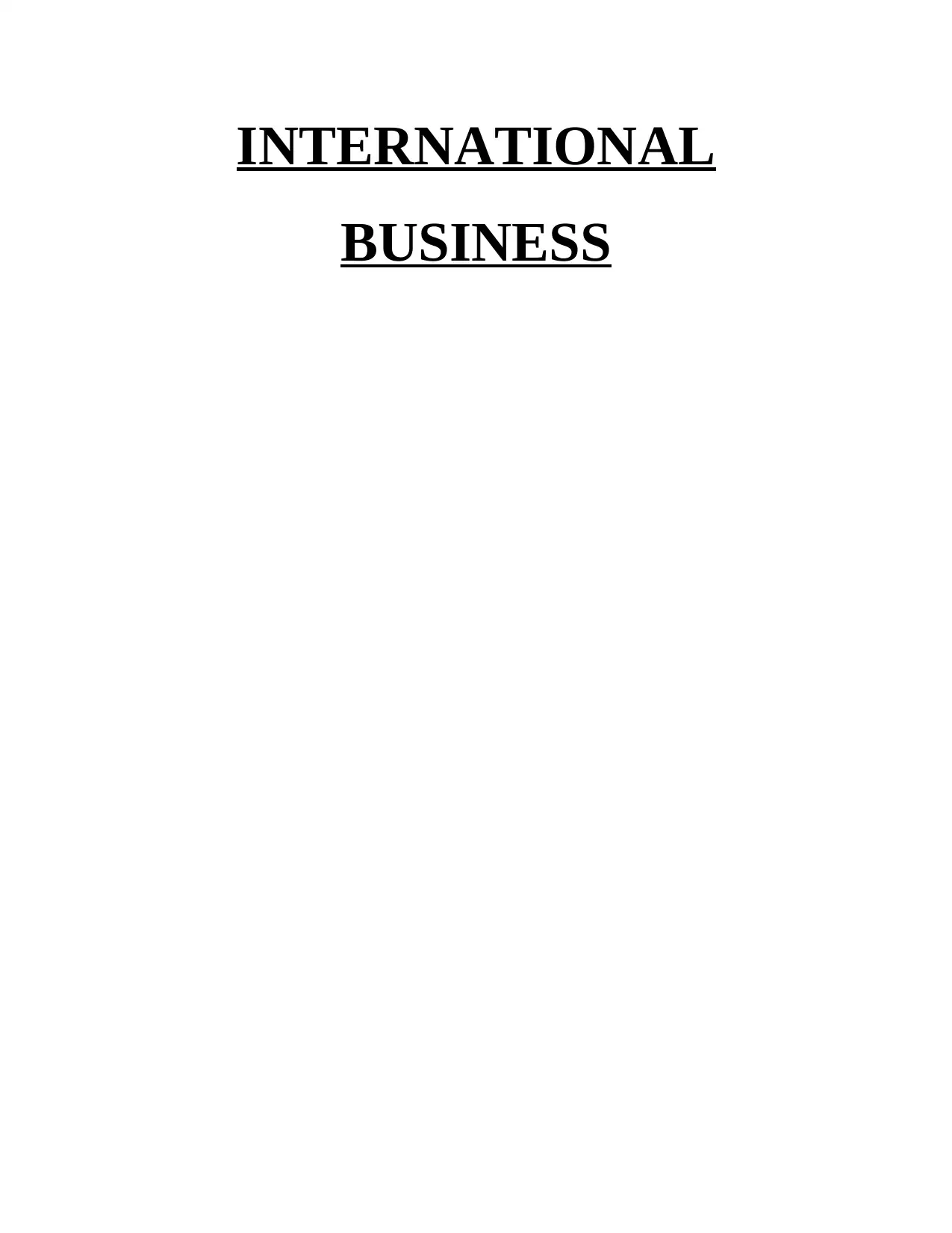
INTERNATIONAL
BUSINESS
BUSINESS
Paraphrase This Document
Need a fresh take? Get an instant paraphrase of this document with our AI Paraphraser
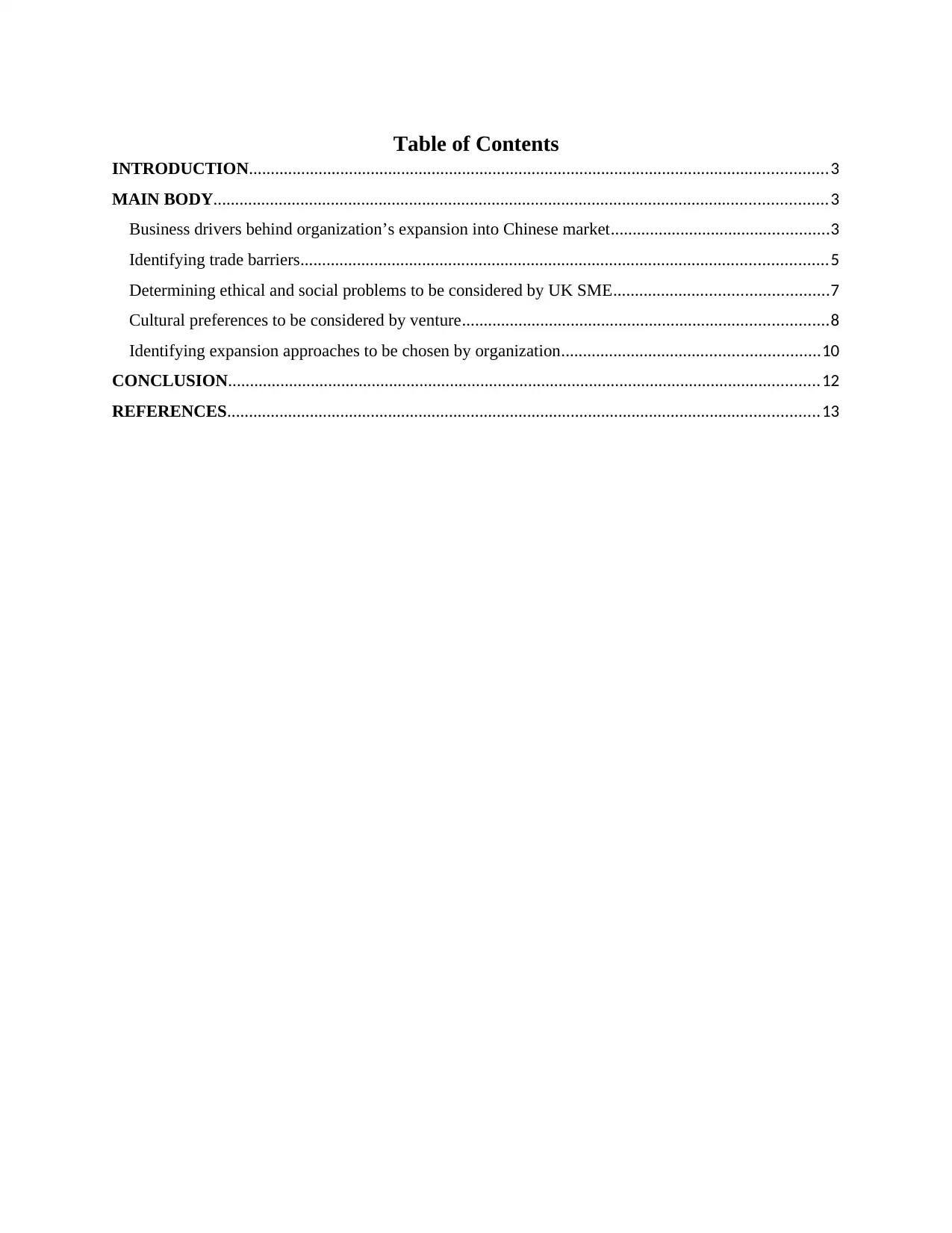
Table of Contents
INTRODUCTION.....................................................................................................................................3
MAIN BODY.............................................................................................................................................3
Business drivers behind organization’s expansion into Chinese market..................................................3
Identifying trade barriers.........................................................................................................................5
Determining ethical and social problems to be considered by UK SME.................................................7
Cultural preferences to be considered by venture....................................................................................8
Identifying expansion approaches to be chosen by organization...........................................................10
CONCLUSION........................................................................................................................................12
REFERENCES........................................................................................................................................13
INTRODUCTION.....................................................................................................................................3
MAIN BODY.............................................................................................................................................3
Business drivers behind organization’s expansion into Chinese market..................................................3
Identifying trade barriers.........................................................................................................................5
Determining ethical and social problems to be considered by UK SME.................................................7
Cultural preferences to be considered by venture....................................................................................8
Identifying expansion approaches to be chosen by organization...........................................................10
CONCLUSION........................................................................................................................................12
REFERENCES........................................................................................................................................13
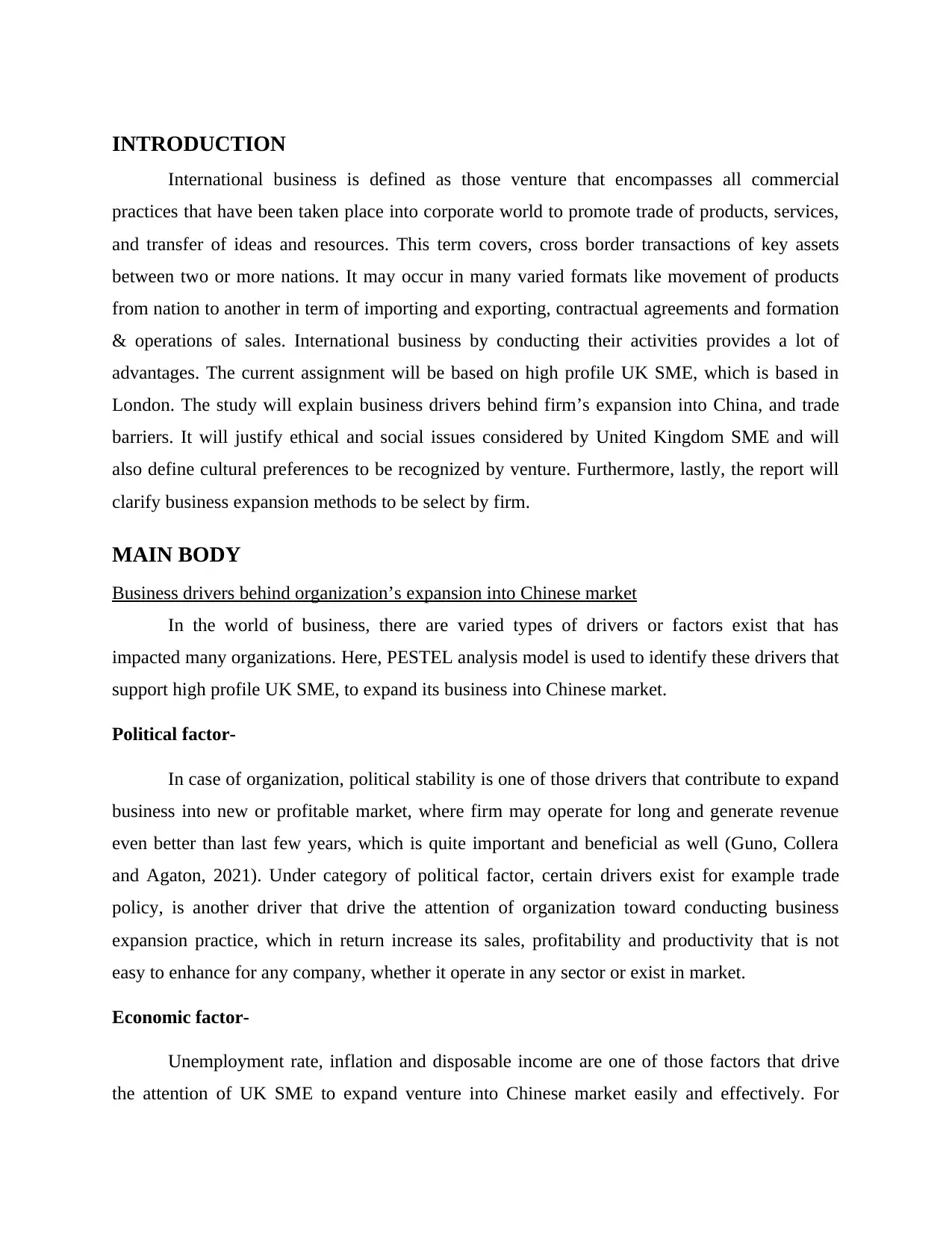
INTRODUCTION
International business is defined as those venture that encompasses all commercial
practices that have been taken place into corporate world to promote trade of products, services,
and transfer of ideas and resources. This term covers, cross border transactions of key assets
between two or more nations. It may occur in many varied formats like movement of products
from nation to another in term of importing and exporting, contractual agreements and formation
& operations of sales. International business by conducting their activities provides a lot of
advantages. The current assignment will be based on high profile UK SME, which is based in
London. The study will explain business drivers behind firm’s expansion into China, and trade
barriers. It will justify ethical and social issues considered by United Kingdom SME and will
also define cultural preferences to be recognized by venture. Furthermore, lastly, the report will
clarify business expansion methods to be select by firm.
MAIN BODY
Business drivers behind organization’s expansion into Chinese market
In the world of business, there are varied types of drivers or factors exist that has
impacted many organizations. Here, PESTEL analysis model is used to identify these drivers that
support high profile UK SME, to expand its business into Chinese market.
Political factor-
In case of organization, political stability is one of those drivers that contribute to expand
business into new or profitable market, where firm may operate for long and generate revenue
even better than last few years, which is quite important and beneficial as well (Guno, Collera
and Agaton, 2021). Under category of political factor, certain drivers exist for example trade
policy, is another driver that drive the attention of organization toward conducting business
expansion practice, which in return increase its sales, profitability and productivity that is not
easy to enhance for any company, whether it operate in any sector or exist in market.
Economic factor-
Unemployment rate, inflation and disposable income are one of those factors that drive
the attention of UK SME to expand venture into Chinese market easily and effectively. For
International business is defined as those venture that encompasses all commercial
practices that have been taken place into corporate world to promote trade of products, services,
and transfer of ideas and resources. This term covers, cross border transactions of key assets
between two or more nations. It may occur in many varied formats like movement of products
from nation to another in term of importing and exporting, contractual agreements and formation
& operations of sales. International business by conducting their activities provides a lot of
advantages. The current assignment will be based on high profile UK SME, which is based in
London. The study will explain business drivers behind firm’s expansion into China, and trade
barriers. It will justify ethical and social issues considered by United Kingdom SME and will
also define cultural preferences to be recognized by venture. Furthermore, lastly, the report will
clarify business expansion methods to be select by firm.
MAIN BODY
Business drivers behind organization’s expansion into Chinese market
In the world of business, there are varied types of drivers or factors exist that has
impacted many organizations. Here, PESTEL analysis model is used to identify these drivers that
support high profile UK SME, to expand its business into Chinese market.
Political factor-
In case of organization, political stability is one of those drivers that contribute to expand
business into new or profitable market, where firm may operate for long and generate revenue
even better than last few years, which is quite important and beneficial as well (Guno, Collera
and Agaton, 2021). Under category of political factor, certain drivers exist for example trade
policy, is another driver that drive the attention of organization toward conducting business
expansion practice, which in return increase its sales, profitability and productivity that is not
easy to enhance for any company, whether it operate in any sector or exist in market.
Economic factor-
Unemployment rate, inflation and disposable income are one of those factors that drive
the attention of UK SME to expand venture into Chinese market easily and effectively. For
⊘ This is a preview!⊘
Do you want full access?
Subscribe today to unlock all pages.

Trusted by 1+ million students worldwide
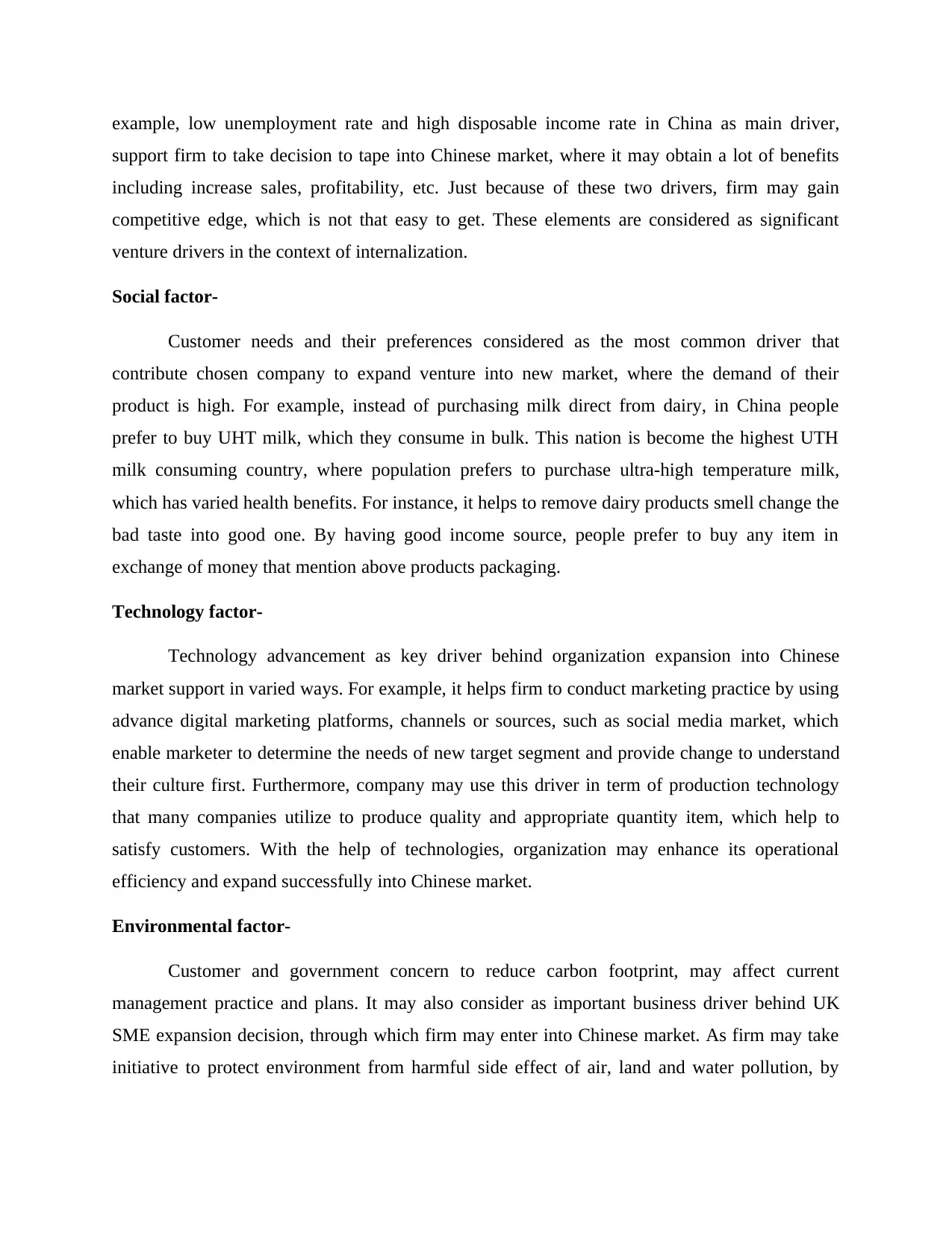
example, low unemployment rate and high disposable income rate in China as main driver,
support firm to take decision to tape into Chinese market, where it may obtain a lot of benefits
including increase sales, profitability, etc. Just because of these two drivers, firm may gain
competitive edge, which is not that easy to get. These elements are considered as significant
venture drivers in the context of internalization.
Social factor-
Customer needs and their preferences considered as the most common driver that
contribute chosen company to expand venture into new market, where the demand of their
product is high. For example, instead of purchasing milk direct from dairy, in China people
prefer to buy UHT milk, which they consume in bulk. This nation is become the highest UTH
milk consuming country, where population prefers to purchase ultra-high temperature milk,
which has varied health benefits. For instance, it helps to remove dairy products smell change the
bad taste into good one. By having good income source, people prefer to buy any item in
exchange of money that mention above products packaging.
Technology factor-
Technology advancement as key driver behind organization expansion into Chinese
market support in varied ways. For example, it helps firm to conduct marketing practice by using
advance digital marketing platforms, channels or sources, such as social media market, which
enable marketer to determine the needs of new target segment and provide change to understand
their culture first. Furthermore, company may use this driver in term of production technology
that many companies utilize to produce quality and appropriate quantity item, which help to
satisfy customers. With the help of technologies, organization may enhance its operational
efficiency and expand successfully into Chinese market.
Environmental factor-
Customer and government concern to reduce carbon footprint, may affect current
management practice and plans. It may also consider as important business driver behind UK
SME expansion decision, through which firm may enter into Chinese market. As firm may take
initiative to protect environment from harmful side effect of air, land and water pollution, by
support firm to take decision to tape into Chinese market, where it may obtain a lot of benefits
including increase sales, profitability, etc. Just because of these two drivers, firm may gain
competitive edge, which is not that easy to get. These elements are considered as significant
venture drivers in the context of internalization.
Social factor-
Customer needs and their preferences considered as the most common driver that
contribute chosen company to expand venture into new market, where the demand of their
product is high. For example, instead of purchasing milk direct from dairy, in China people
prefer to buy UHT milk, which they consume in bulk. This nation is become the highest UTH
milk consuming country, where population prefers to purchase ultra-high temperature milk,
which has varied health benefits. For instance, it helps to remove dairy products smell change the
bad taste into good one. By having good income source, people prefer to buy any item in
exchange of money that mention above products packaging.
Technology factor-
Technology advancement as key driver behind organization expansion into Chinese
market support in varied ways. For example, it helps firm to conduct marketing practice by using
advance digital marketing platforms, channels or sources, such as social media market, which
enable marketer to determine the needs of new target segment and provide change to understand
their culture first. Furthermore, company may use this driver in term of production technology
that many companies utilize to produce quality and appropriate quantity item, which help to
satisfy customers. With the help of technologies, organization may enhance its operational
efficiency and expand successfully into Chinese market.
Environmental factor-
Customer and government concern to reduce carbon footprint, may affect current
management practice and plans. It may also consider as important business driver behind UK
SME expansion decision, through which firm may enter into Chinese market. As firm may take
initiative to protect environment from harmful side effect of air, land and water pollution, by
Paraphrase This Document
Need a fresh take? Get an instant paraphrase of this document with our AI Paraphraser
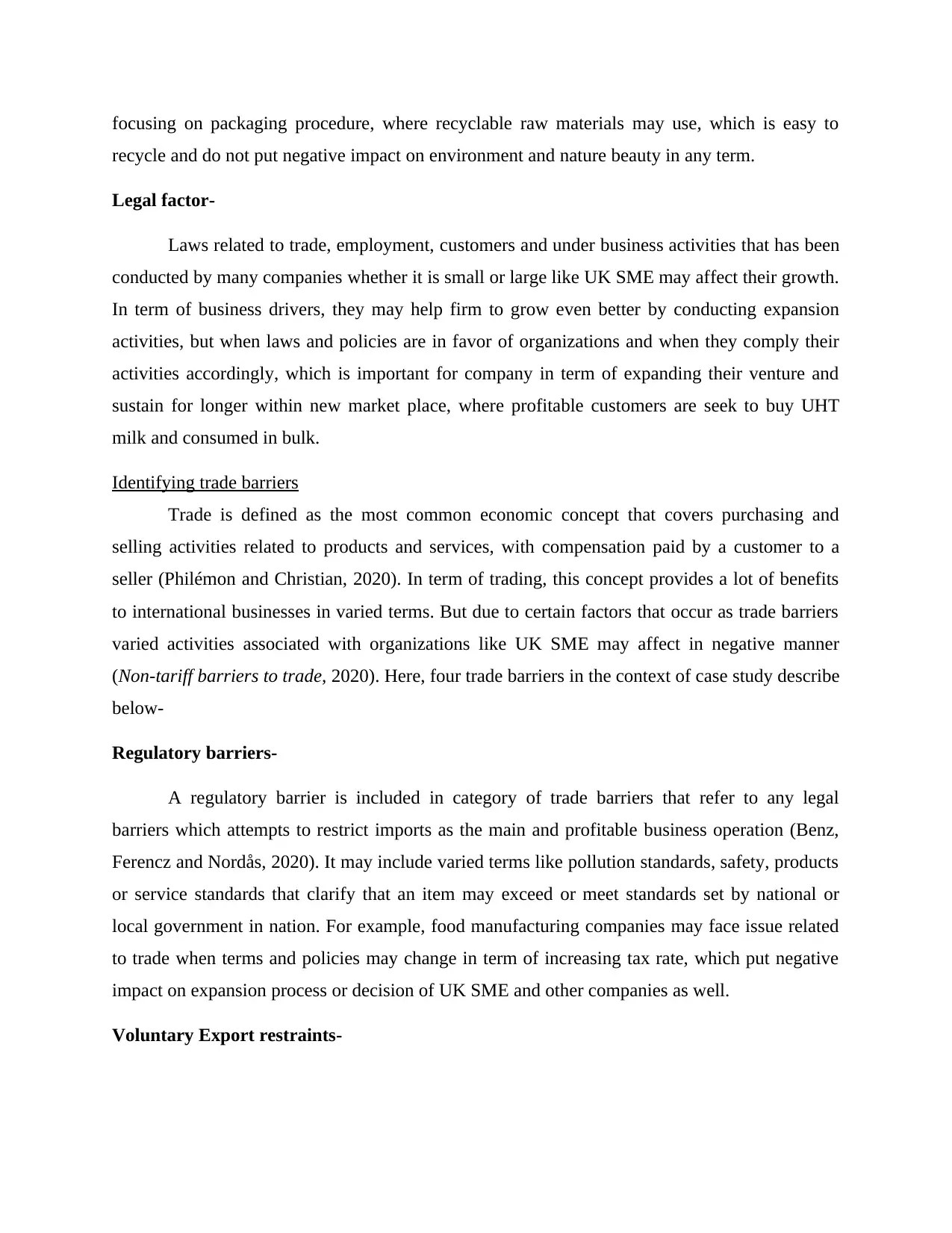
focusing on packaging procedure, where recyclable raw materials may use, which is easy to
recycle and do not put negative impact on environment and nature beauty in any term.
Legal factor-
Laws related to trade, employment, customers and under business activities that has been
conducted by many companies whether it is small or large like UK SME may affect their growth.
In term of business drivers, they may help firm to grow even better by conducting expansion
activities, but when laws and policies are in favor of organizations and when they comply their
activities accordingly, which is important for company in term of expanding their venture and
sustain for longer within new market place, where profitable customers are seek to buy UHT
milk and consumed in bulk.
Identifying trade barriers
Trade is defined as the most common economic concept that covers purchasing and
selling activities related to products and services, with compensation paid by a customer to a
seller (Philémon and Christian, 2020). In term of trading, this concept provides a lot of benefits
to international businesses in varied terms. But due to certain factors that occur as trade barriers
varied activities associated with organizations like UK SME may affect in negative manner
(Non-tariff barriers to trade, 2020). Here, four trade barriers in the context of case study describe
below-
Regulatory barriers-
A regulatory barrier is included in category of trade barriers that refer to any legal
barriers which attempts to restrict imports as the main and profitable business operation (Benz,
Ferencz and Nordås, 2020). It may include varied terms like pollution standards, safety, products
or service standards that clarify that an item may exceed or meet standards set by national or
local government in nation. For example, food manufacturing companies may face issue related
to trade when terms and policies may change in term of increasing tax rate, which put negative
impact on expansion process or decision of UK SME and other companies as well.
Voluntary Export restraints-
recycle and do not put negative impact on environment and nature beauty in any term.
Legal factor-
Laws related to trade, employment, customers and under business activities that has been
conducted by many companies whether it is small or large like UK SME may affect their growth.
In term of business drivers, they may help firm to grow even better by conducting expansion
activities, but when laws and policies are in favor of organizations and when they comply their
activities accordingly, which is important for company in term of expanding their venture and
sustain for longer within new market place, where profitable customers are seek to buy UHT
milk and consumed in bulk.
Identifying trade barriers
Trade is defined as the most common economic concept that covers purchasing and
selling activities related to products and services, with compensation paid by a customer to a
seller (Philémon and Christian, 2020). In term of trading, this concept provides a lot of benefits
to international businesses in varied terms. But due to certain factors that occur as trade barriers
varied activities associated with organizations like UK SME may affect in negative manner
(Non-tariff barriers to trade, 2020). Here, four trade barriers in the context of case study describe
below-
Regulatory barriers-
A regulatory barrier is included in category of trade barriers that refer to any legal
barriers which attempts to restrict imports as the main and profitable business operation (Benz,
Ferencz and Nordås, 2020). It may include varied terms like pollution standards, safety, products
or service standards that clarify that an item may exceed or meet standards set by national or
local government in nation. For example, food manufacturing companies may face issue related
to trade when terms and policies may change in term of increasing tax rate, which put negative
impact on expansion process or decision of UK SME and other companies as well.
Voluntary Export restraints-
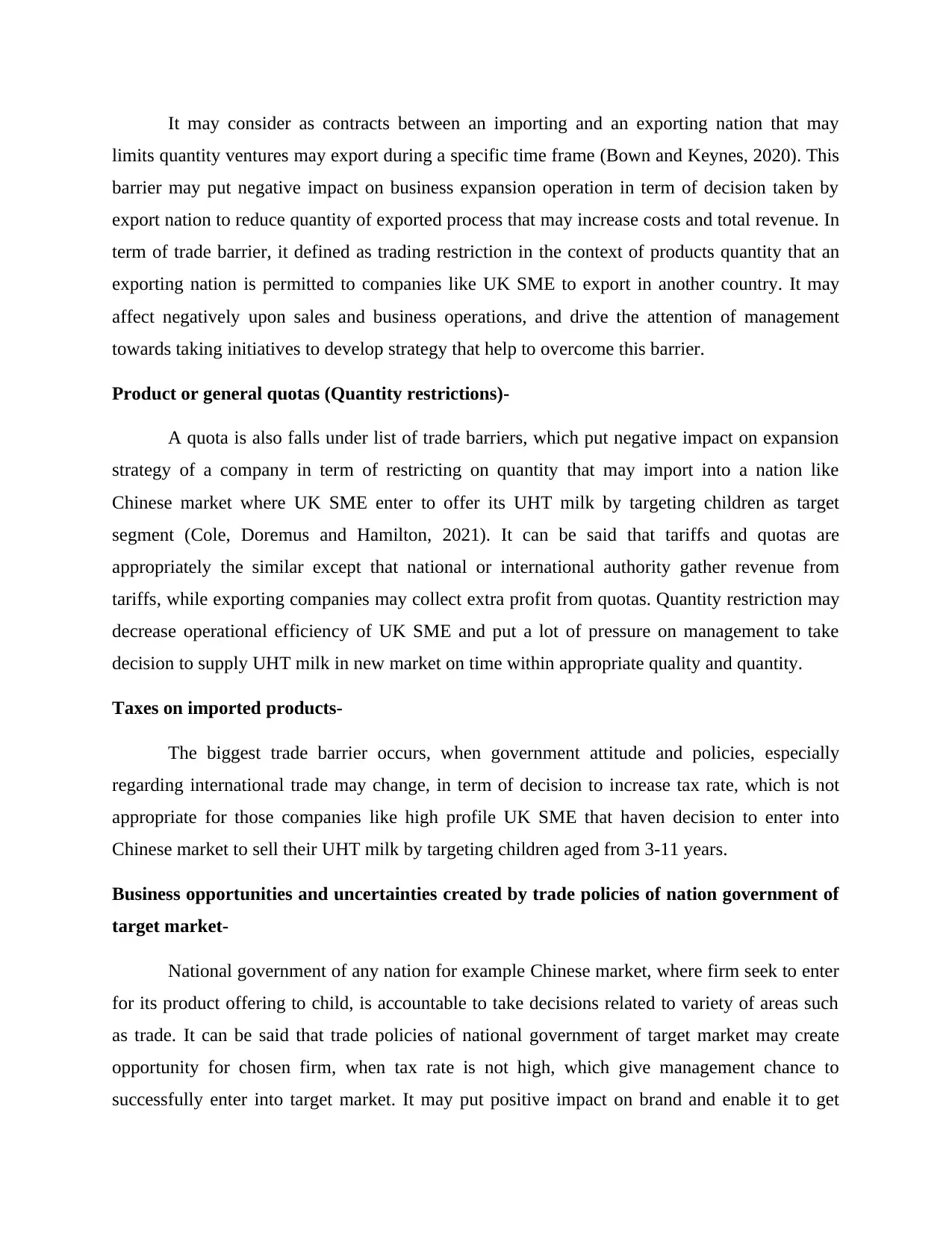
It may consider as contracts between an importing and an exporting nation that may
limits quantity ventures may export during a specific time frame (Bown and Keynes, 2020). This
barrier may put negative impact on business expansion operation in term of decision taken by
export nation to reduce quantity of exported process that may increase costs and total revenue. In
term of trade barrier, it defined as trading restriction in the context of products quantity that an
exporting nation is permitted to companies like UK SME to export in another country. It may
affect negatively upon sales and business operations, and drive the attention of management
towards taking initiatives to develop strategy that help to overcome this barrier.
Product or general quotas (Quantity restrictions)-
A quota is also falls under list of trade barriers, which put negative impact on expansion
strategy of a company in term of restricting on quantity that may import into a nation like
Chinese market where UK SME enter to offer its UHT milk by targeting children as target
segment (Cole, Doremus and Hamilton, 2021). It can be said that tariffs and quotas are
appropriately the similar except that national or international authority gather revenue from
tariffs, while exporting companies may collect extra profit from quotas. Quantity restriction may
decrease operational efficiency of UK SME and put a lot of pressure on management to take
decision to supply UHT milk in new market on time within appropriate quality and quantity.
Taxes on imported products-
The biggest trade barrier occurs, when government attitude and policies, especially
regarding international trade may change, in term of decision to increase tax rate, which is not
appropriate for those companies like high profile UK SME that haven decision to enter into
Chinese market to sell their UHT milk by targeting children aged from 3-11 years.
Business opportunities and uncertainties created by trade policies of nation government of
target market-
National government of any nation for example Chinese market, where firm seek to enter
for its product offering to child, is accountable to take decisions related to variety of areas such
as trade. It can be said that trade policies of national government of target market may create
opportunity for chosen firm, when tax rate is not high, which give management chance to
successfully enter into target market. It may put positive impact on brand and enable it to get
limits quantity ventures may export during a specific time frame (Bown and Keynes, 2020). This
barrier may put negative impact on business expansion operation in term of decision taken by
export nation to reduce quantity of exported process that may increase costs and total revenue. In
term of trade barrier, it defined as trading restriction in the context of products quantity that an
exporting nation is permitted to companies like UK SME to export in another country. It may
affect negatively upon sales and business operations, and drive the attention of management
towards taking initiatives to develop strategy that help to overcome this barrier.
Product or general quotas (Quantity restrictions)-
A quota is also falls under list of trade barriers, which put negative impact on expansion
strategy of a company in term of restricting on quantity that may import into a nation like
Chinese market where UK SME enter to offer its UHT milk by targeting children as target
segment (Cole, Doremus and Hamilton, 2021). It can be said that tariffs and quotas are
appropriately the similar except that national or international authority gather revenue from
tariffs, while exporting companies may collect extra profit from quotas. Quantity restriction may
decrease operational efficiency of UK SME and put a lot of pressure on management to take
decision to supply UHT milk in new market on time within appropriate quality and quantity.
Taxes on imported products-
The biggest trade barrier occurs, when government attitude and policies, especially
regarding international trade may change, in term of decision to increase tax rate, which is not
appropriate for those companies like high profile UK SME that haven decision to enter into
Chinese market to sell their UHT milk by targeting children aged from 3-11 years.
Business opportunities and uncertainties created by trade policies of nation government of
target market-
National government of any nation for example Chinese market, where firm seek to enter
for its product offering to child, is accountable to take decisions related to variety of areas such
as trade. It can be said that trade policies of national government of target market may create
opportunity for chosen firm, when tax rate is not high, which give management chance to
successfully enter into target market. It may put positive impact on brand and enable it to get
⊘ This is a preview!⊘
Do you want full access?
Subscribe today to unlock all pages.

Trusted by 1+ million students worldwide
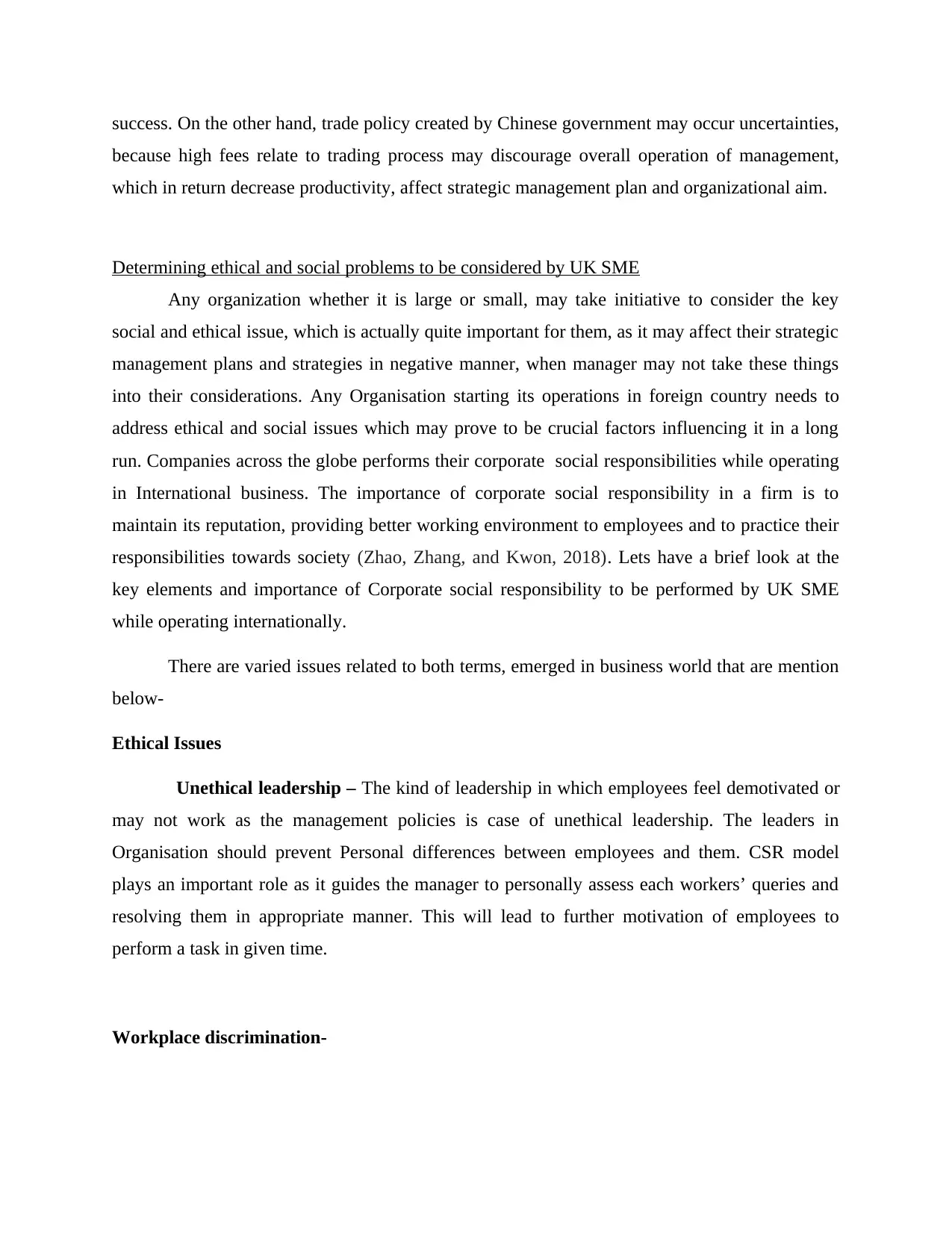
success. On the other hand, trade policy created by Chinese government may occur uncertainties,
because high fees relate to trading process may discourage overall operation of management,
which in return decrease productivity, affect strategic management plan and organizational aim.
Determining ethical and social problems to be considered by UK SME
Any organization whether it is large or small, may take initiative to consider the key
social and ethical issue, which is actually quite important for them, as it may affect their strategic
management plans and strategies in negative manner, when manager may not take these things
into their considerations. Any Organisation starting its operations in foreign country needs to
address ethical and social issues which may prove to be crucial factors influencing it in a long
run. Companies across the globe performs their corporate social responsibilities while operating
in International business. The importance of corporate social responsibility in a firm is to
maintain its reputation, providing better working environment to employees and to practice their
responsibilities towards society (Zhao, Zhang, and Kwon, 2018). Lets have a brief look at the
key elements and importance of Corporate social responsibility to be performed by UK SME
while operating internationally.
There are varied issues related to both terms, emerged in business world that are mention
below-
Ethical Issues
Unethical leadership – The kind of leadership in which employees feel demotivated or
may not work as the management policies is case of unethical leadership. The leaders in
Organisation should prevent Personal differences between employees and them. CSR model
plays an important role as it guides the manager to personally assess each workers’ queries and
resolving them in appropriate manner. This will lead to further motivation of employees to
perform a task in given time.
Workplace discrimination-
because high fees relate to trading process may discourage overall operation of management,
which in return decrease productivity, affect strategic management plan and organizational aim.
Determining ethical and social problems to be considered by UK SME
Any organization whether it is large or small, may take initiative to consider the key
social and ethical issue, which is actually quite important for them, as it may affect their strategic
management plans and strategies in negative manner, when manager may not take these things
into their considerations. Any Organisation starting its operations in foreign country needs to
address ethical and social issues which may prove to be crucial factors influencing it in a long
run. Companies across the globe performs their corporate social responsibilities while operating
in International business. The importance of corporate social responsibility in a firm is to
maintain its reputation, providing better working environment to employees and to practice their
responsibilities towards society (Zhao, Zhang, and Kwon, 2018). Lets have a brief look at the
key elements and importance of Corporate social responsibility to be performed by UK SME
while operating internationally.
There are varied issues related to both terms, emerged in business world that are mention
below-
Ethical Issues
Unethical leadership – The kind of leadership in which employees feel demotivated or
may not work as the management policies is case of unethical leadership. The leaders in
Organisation should prevent Personal differences between employees and them. CSR model
plays an important role as it guides the manager to personally assess each workers’ queries and
resolving them in appropriate manner. This will lead to further motivation of employees to
perform a task in given time.
Workplace discrimination-
Paraphrase This Document
Need a fresh take? Get an instant paraphrase of this document with our AI Paraphraser
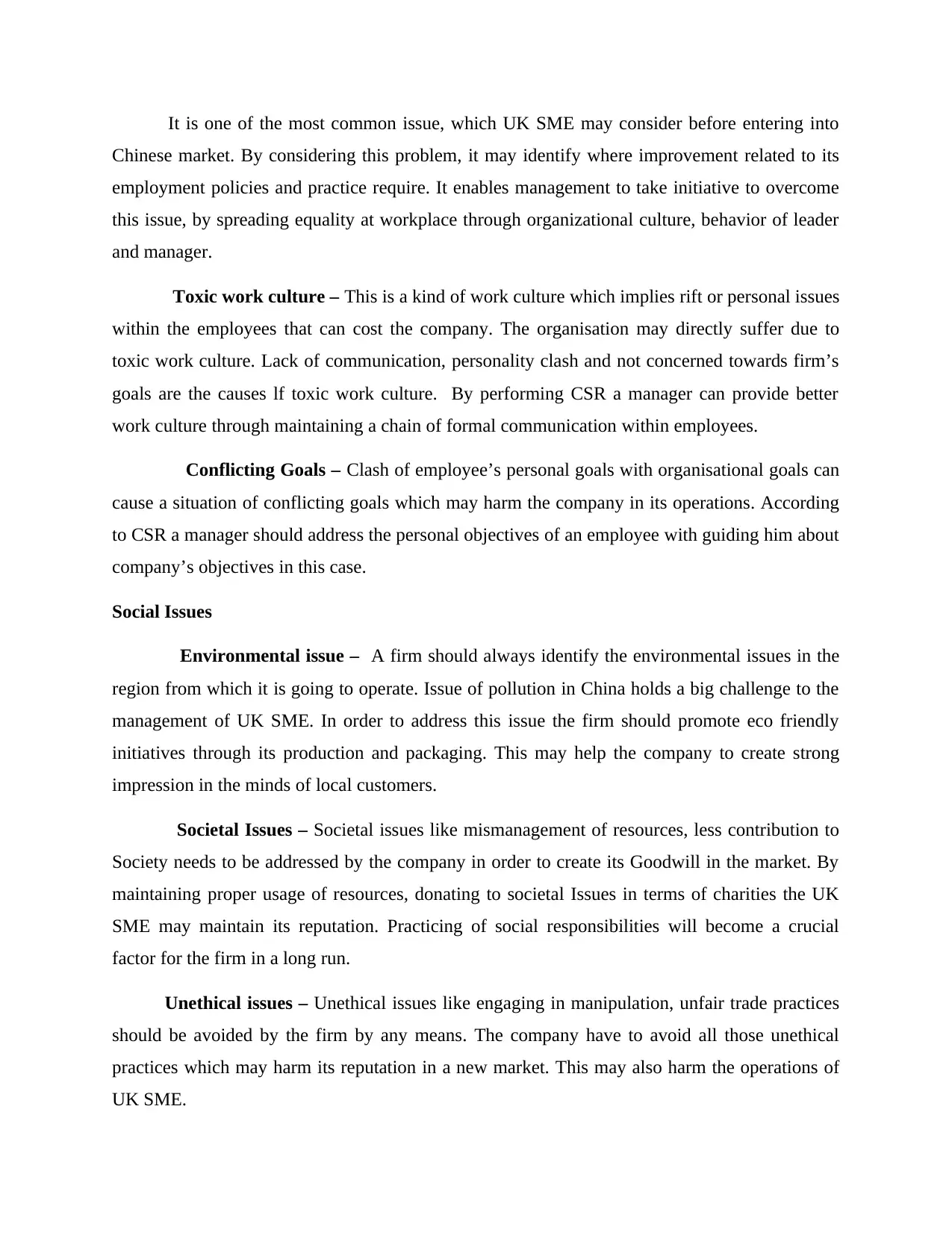
It is one of the most common issue, which UK SME may consider before entering into
Chinese market. By considering this problem, it may identify where improvement related to its
employment policies and practice require. It enables management to take initiative to overcome
this issue, by spreading equality at workplace through organizational culture, behavior of leader
and manager.
Toxic work culture – This is a kind of work culture which implies rift or personal issues
within the employees that can cost the company. The organisation may directly suffer due to
toxic work culture. Lack of communication, personality clash and not concerned towards firm’s
goals are the causes lf toxic work culture. By performing CSR a manager can provide better
work culture through maintaining a chain of formal communication within employees.
Conflicting Goals – Clash of employee’s personal goals with organisational goals can
cause a situation of conflicting goals which may harm the company in its operations. According
to CSR a manager should address the personal objectives of an employee with guiding him about
company’s objectives in this case.
Social Issues
Environmental issue – A firm should always identify the environmental issues in the
region from which it is going to operate. Issue of pollution in China holds a big challenge to the
management of UK SME. In order to address this issue the firm should promote eco friendly
initiatives through its production and packaging. This may help the company to create strong
impression in the minds of local customers.
Societal Issues – Societal issues like mismanagement of resources, less contribution to
Society needs to be addressed by the company in order to create its Goodwill in the market. By
maintaining proper usage of resources, donating to societal Issues in terms of charities the UK
SME may maintain its reputation. Practicing of social responsibilities will become a crucial
factor for the firm in a long run.
Unethical issues – Unethical issues like engaging in manipulation, unfair trade practices
should be avoided by the firm by any means. The company have to avoid all those unethical
practices which may harm its reputation in a new market. This may also harm the operations of
UK SME.
Chinese market. By considering this problem, it may identify where improvement related to its
employment policies and practice require. It enables management to take initiative to overcome
this issue, by spreading equality at workplace through organizational culture, behavior of leader
and manager.
Toxic work culture – This is a kind of work culture which implies rift or personal issues
within the employees that can cost the company. The organisation may directly suffer due to
toxic work culture. Lack of communication, personality clash and not concerned towards firm’s
goals are the causes lf toxic work culture. By performing CSR a manager can provide better
work culture through maintaining a chain of formal communication within employees.
Conflicting Goals – Clash of employee’s personal goals with organisational goals can
cause a situation of conflicting goals which may harm the company in its operations. According
to CSR a manager should address the personal objectives of an employee with guiding him about
company’s objectives in this case.
Social Issues
Environmental issue – A firm should always identify the environmental issues in the
region from which it is going to operate. Issue of pollution in China holds a big challenge to the
management of UK SME. In order to address this issue the firm should promote eco friendly
initiatives through its production and packaging. This may help the company to create strong
impression in the minds of local customers.
Societal Issues – Societal issues like mismanagement of resources, less contribution to
Society needs to be addressed by the company in order to create its Goodwill in the market. By
maintaining proper usage of resources, donating to societal Issues in terms of charities the UK
SME may maintain its reputation. Practicing of social responsibilities will become a crucial
factor for the firm in a long run.
Unethical issues – Unethical issues like engaging in manipulation, unfair trade practices
should be avoided by the firm by any means. The company have to avoid all those unethical
practices which may harm its reputation in a new market. This may also harm the operations of
UK SME.
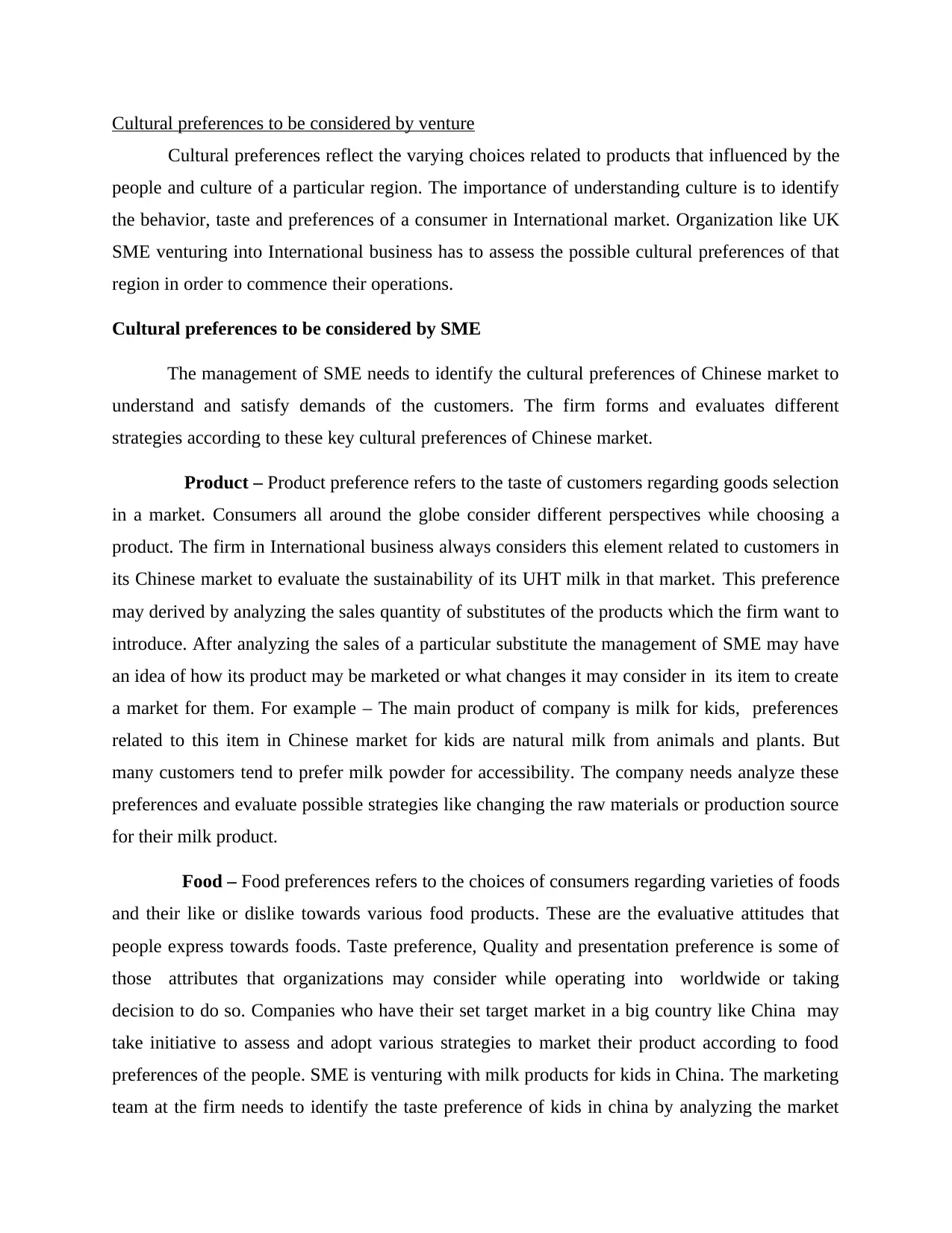
Cultural preferences to be considered by venture
Cultural preferences reflect the varying choices related to products that influenced by the
people and culture of a particular region. The importance of understanding culture is to identify
the behavior, taste and preferences of a consumer in International market. Organization like UK
SME venturing into International business has to assess the possible cultural preferences of that
region in order to commence their operations.
Cultural preferences to be considered by SME
The management of SME needs to identify the cultural preferences of Chinese market to
understand and satisfy demands of the customers. The firm forms and evaluates different
strategies according to these key cultural preferences of Chinese market.
Product – Product preference refers to the taste of customers regarding goods selection
in a market. Consumers all around the globe consider different perspectives while choosing a
product. The firm in International business always considers this element related to customers in
its Chinese market to evaluate the sustainability of its UHT milk in that market. This preference
may derived by analyzing the sales quantity of substitutes of the products which the firm want to
introduce. After analyzing the sales of a particular substitute the management of SME may have
an idea of how its product may be marketed or what changes it may consider in its item to create
a market for them. For example – The main product of company is milk for kids, preferences
related to this item in Chinese market for kids are natural milk from animals and plants. But
many customers tend to prefer milk powder for accessibility. The company needs analyze these
preferences and evaluate possible strategies like changing the raw materials or production source
for their milk product.
Food – Food preferences refers to the choices of consumers regarding varieties of foods
and their like or dislike towards various food products. These are the evaluative attitudes that
people express towards foods. Taste preference, Quality and presentation preference is some of
those attributes that organizations may consider while operating into worldwide or taking
decision to do so. Companies who have their set target market in a big country like China may
take initiative to assess and adopt various strategies to market their product according to food
preferences of the people. SME is venturing with milk products for kids in China. The marketing
team at the firm needs to identify the taste preference of kids in china by analyzing the market
Cultural preferences reflect the varying choices related to products that influenced by the
people and culture of a particular region. The importance of understanding culture is to identify
the behavior, taste and preferences of a consumer in International market. Organization like UK
SME venturing into International business has to assess the possible cultural preferences of that
region in order to commence their operations.
Cultural preferences to be considered by SME
The management of SME needs to identify the cultural preferences of Chinese market to
understand and satisfy demands of the customers. The firm forms and evaluates different
strategies according to these key cultural preferences of Chinese market.
Product – Product preference refers to the taste of customers regarding goods selection
in a market. Consumers all around the globe consider different perspectives while choosing a
product. The firm in International business always considers this element related to customers in
its Chinese market to evaluate the sustainability of its UHT milk in that market. This preference
may derived by analyzing the sales quantity of substitutes of the products which the firm want to
introduce. After analyzing the sales of a particular substitute the management of SME may have
an idea of how its product may be marketed or what changes it may consider in its item to create
a market for them. For example – The main product of company is milk for kids, preferences
related to this item in Chinese market for kids are natural milk from animals and plants. But
many customers tend to prefer milk powder for accessibility. The company needs analyze these
preferences and evaluate possible strategies like changing the raw materials or production source
for their milk product.
Food – Food preferences refers to the choices of consumers regarding varieties of foods
and their like or dislike towards various food products. These are the evaluative attitudes that
people express towards foods. Taste preference, Quality and presentation preference is some of
those attributes that organizations may consider while operating into worldwide or taking
decision to do so. Companies who have their set target market in a big country like China may
take initiative to assess and adopt various strategies to market their product according to food
preferences of the people. SME is venturing with milk products for kids in China. The marketing
team at the firm needs to identify the taste preference of kids in china by analyzing the market
⊘ This is a preview!⊘
Do you want full access?
Subscribe today to unlock all pages.

Trusted by 1+ million students worldwide
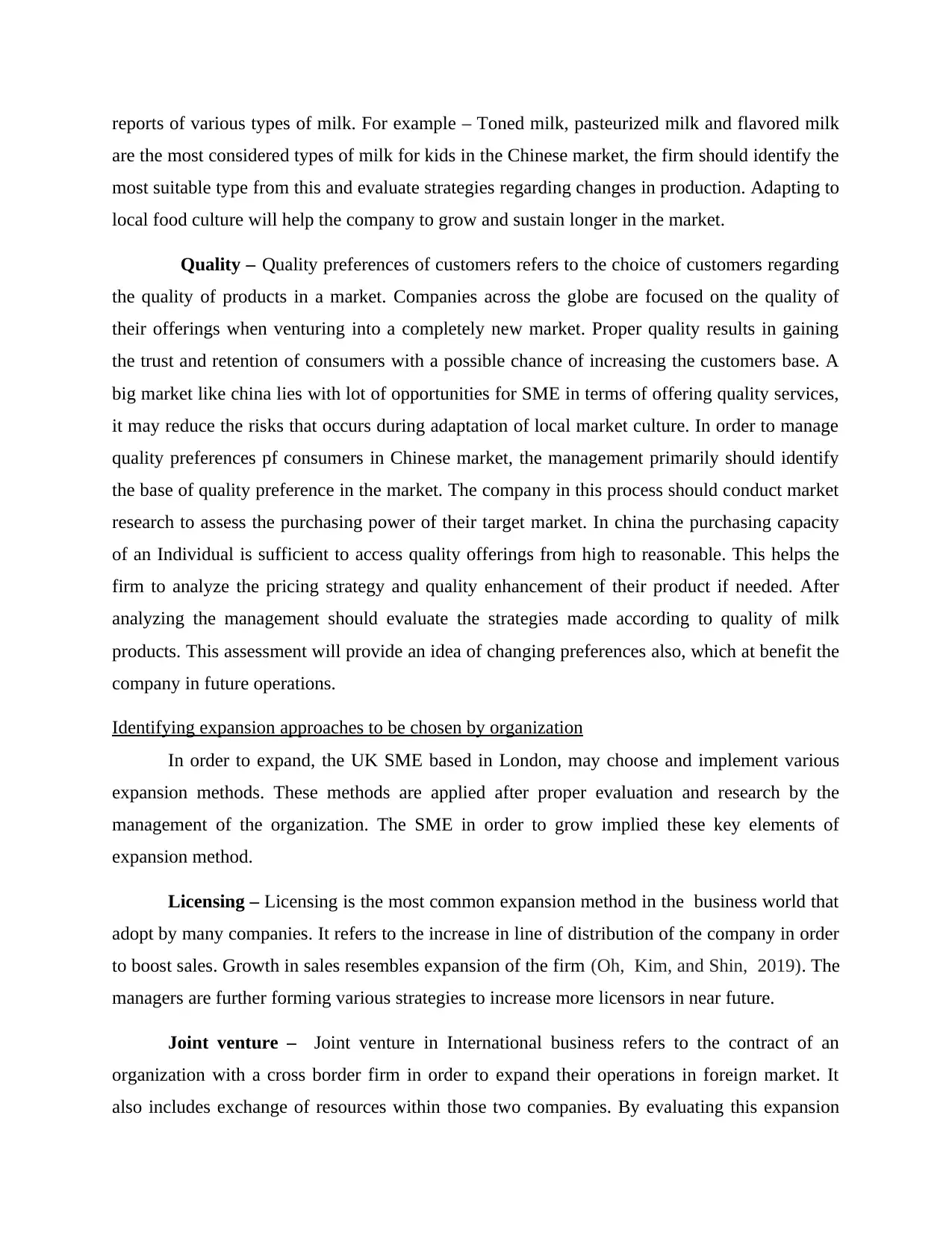
reports of various types of milk. For example – Toned milk, pasteurized milk and flavored milk
are the most considered types of milk for kids in the Chinese market, the firm should identify the
most suitable type from this and evaluate strategies regarding changes in production. Adapting to
local food culture will help the company to grow and sustain longer in the market.
Quality – Quality preferences of customers refers to the choice of customers regarding
the quality of products in a market. Companies across the globe are focused on the quality of
their offerings when venturing into a completely new market. Proper quality results in gaining
the trust and retention of consumers with a possible chance of increasing the customers base. A
big market like china lies with lot of opportunities for SME in terms of offering quality services,
it may reduce the risks that occurs during adaptation of local market culture. In order to manage
quality preferences pf consumers in Chinese market, the management primarily should identify
the base of quality preference in the market. The company in this process should conduct market
research to assess the purchasing power of their target market. In china the purchasing capacity
of an Individual is sufficient to access quality offerings from high to reasonable. This helps the
firm to analyze the pricing strategy and quality enhancement of their product if needed. After
analyzing the management should evaluate the strategies made according to quality of milk
products. This assessment will provide an idea of changing preferences also, which at benefit the
company in future operations.
Identifying expansion approaches to be chosen by organization
In order to expand, the UK SME based in London, may choose and implement various
expansion methods. These methods are applied after proper evaluation and research by the
management of the organization. The SME in order to grow implied these key elements of
expansion method.
Licensing – Licensing is the most common expansion method in the business world that
adopt by many companies. It refers to the increase in line of distribution of the company in order
to boost sales. Growth in sales resembles expansion of the firm (Oh, Kim, and Shin, 2019). The
managers are further forming various strategies to increase more licensors in near future.
Joint venture – Joint venture in International business refers to the contract of an
organization with a cross border firm in order to expand their operations in foreign market. It
also includes exchange of resources within those two companies. By evaluating this expansion
are the most considered types of milk for kids in the Chinese market, the firm should identify the
most suitable type from this and evaluate strategies regarding changes in production. Adapting to
local food culture will help the company to grow and sustain longer in the market.
Quality – Quality preferences of customers refers to the choice of customers regarding
the quality of products in a market. Companies across the globe are focused on the quality of
their offerings when venturing into a completely new market. Proper quality results in gaining
the trust and retention of consumers with a possible chance of increasing the customers base. A
big market like china lies with lot of opportunities for SME in terms of offering quality services,
it may reduce the risks that occurs during adaptation of local market culture. In order to manage
quality preferences pf consumers in Chinese market, the management primarily should identify
the base of quality preference in the market. The company in this process should conduct market
research to assess the purchasing power of their target market. In china the purchasing capacity
of an Individual is sufficient to access quality offerings from high to reasonable. This helps the
firm to analyze the pricing strategy and quality enhancement of their product if needed. After
analyzing the management should evaluate the strategies made according to quality of milk
products. This assessment will provide an idea of changing preferences also, which at benefit the
company in future operations.
Identifying expansion approaches to be chosen by organization
In order to expand, the UK SME based in London, may choose and implement various
expansion methods. These methods are applied after proper evaluation and research by the
management of the organization. The SME in order to grow implied these key elements of
expansion method.
Licensing – Licensing is the most common expansion method in the business world that
adopt by many companies. It refers to the increase in line of distribution of the company in order
to boost sales. Growth in sales resembles expansion of the firm (Oh, Kim, and Shin, 2019). The
managers are further forming various strategies to increase more licensors in near future.
Joint venture – Joint venture in International business refers to the contract of an
organization with a cross border firm in order to expand their operations in foreign market. It
also includes exchange of resources within those two companies. By evaluating this expansion
Paraphrase This Document
Need a fresh take? Get an instant paraphrase of this document with our AI Paraphraser
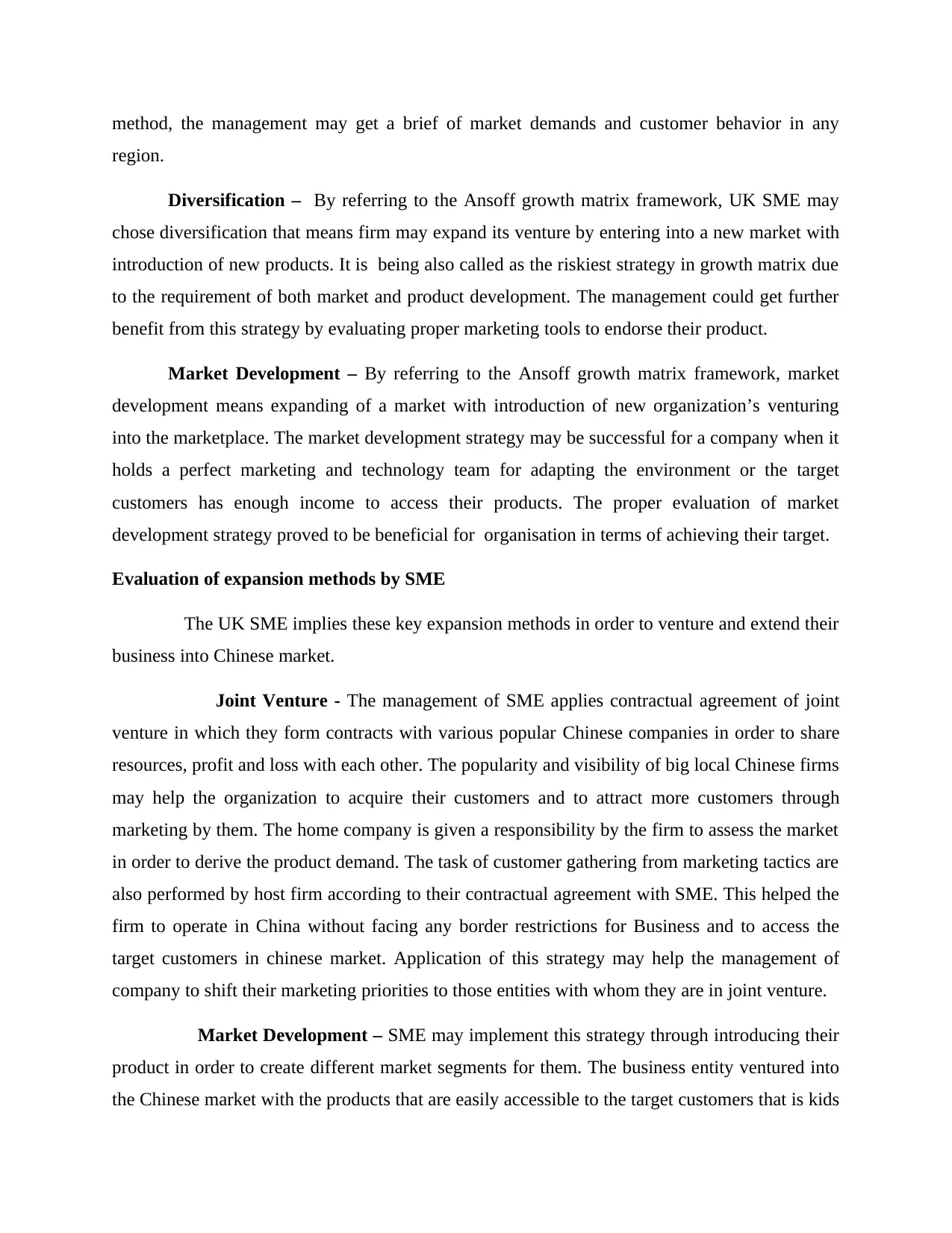
method, the management may get a brief of market demands and customer behavior in any
region.
Diversification – By referring to the Ansoff growth matrix framework, UK SME may
chose diversification that means firm may expand its venture by entering into a new market with
introduction of new products. It is being also called as the riskiest strategy in growth matrix due
to the requirement of both market and product development. The management could get further
benefit from this strategy by evaluating proper marketing tools to endorse their product.
Market Development – By referring to the Ansoff growth matrix framework, market
development means expanding of a market with introduction of new organization’s venturing
into the marketplace. The market development strategy may be successful for a company when it
holds a perfect marketing and technology team for adapting the environment or the target
customers has enough income to access their products. The proper evaluation of market
development strategy proved to be beneficial for organisation in terms of achieving their target.
Evaluation of expansion methods by SME
The UK SME implies these key expansion methods in order to venture and extend their
business into Chinese market.
Joint Venture - The management of SME applies contractual agreement of joint
venture in which they form contracts with various popular Chinese companies in order to share
resources, profit and loss with each other. The popularity and visibility of big local Chinese firms
may help the organization to acquire their customers and to attract more customers through
marketing by them. The home company is given a responsibility by the firm to assess the market
in order to derive the product demand. The task of customer gathering from marketing tactics are
also performed by host firm according to their contractual agreement with SME. This helped the
firm to operate in China without facing any border restrictions for Business and to access the
target customers in chinese market. Application of this strategy may help the management of
company to shift their marketing priorities to those entities with whom they are in joint venture.
Market Development – SME may implement this strategy through introducing their
product in order to create different market segments for them. The business entity ventured into
the Chinese market with the products that are easily accessible to the target customers that is kids
region.
Diversification – By referring to the Ansoff growth matrix framework, UK SME may
chose diversification that means firm may expand its venture by entering into a new market with
introduction of new products. It is being also called as the riskiest strategy in growth matrix due
to the requirement of both market and product development. The management could get further
benefit from this strategy by evaluating proper marketing tools to endorse their product.
Market Development – By referring to the Ansoff growth matrix framework, market
development means expanding of a market with introduction of new organization’s venturing
into the marketplace. The market development strategy may be successful for a company when it
holds a perfect marketing and technology team for adapting the environment or the target
customers has enough income to access their products. The proper evaluation of market
development strategy proved to be beneficial for organisation in terms of achieving their target.
Evaluation of expansion methods by SME
The UK SME implies these key expansion methods in order to venture and extend their
business into Chinese market.
Joint Venture - The management of SME applies contractual agreement of joint
venture in which they form contracts with various popular Chinese companies in order to share
resources, profit and loss with each other. The popularity and visibility of big local Chinese firms
may help the organization to acquire their customers and to attract more customers through
marketing by them. The home company is given a responsibility by the firm to assess the market
in order to derive the product demand. The task of customer gathering from marketing tactics are
also performed by host firm according to their contractual agreement with SME. This helped the
firm to operate in China without facing any border restrictions for Business and to access the
target customers in chinese market. Application of this strategy may help the management of
company to shift their marketing priorities to those entities with whom they are in joint venture.
Market Development – SME may implement this strategy through introducing their
product in order to create different market segments for them. The business entity ventured into
the Chinese market with the products that are easily accessible to the target customers that is kids
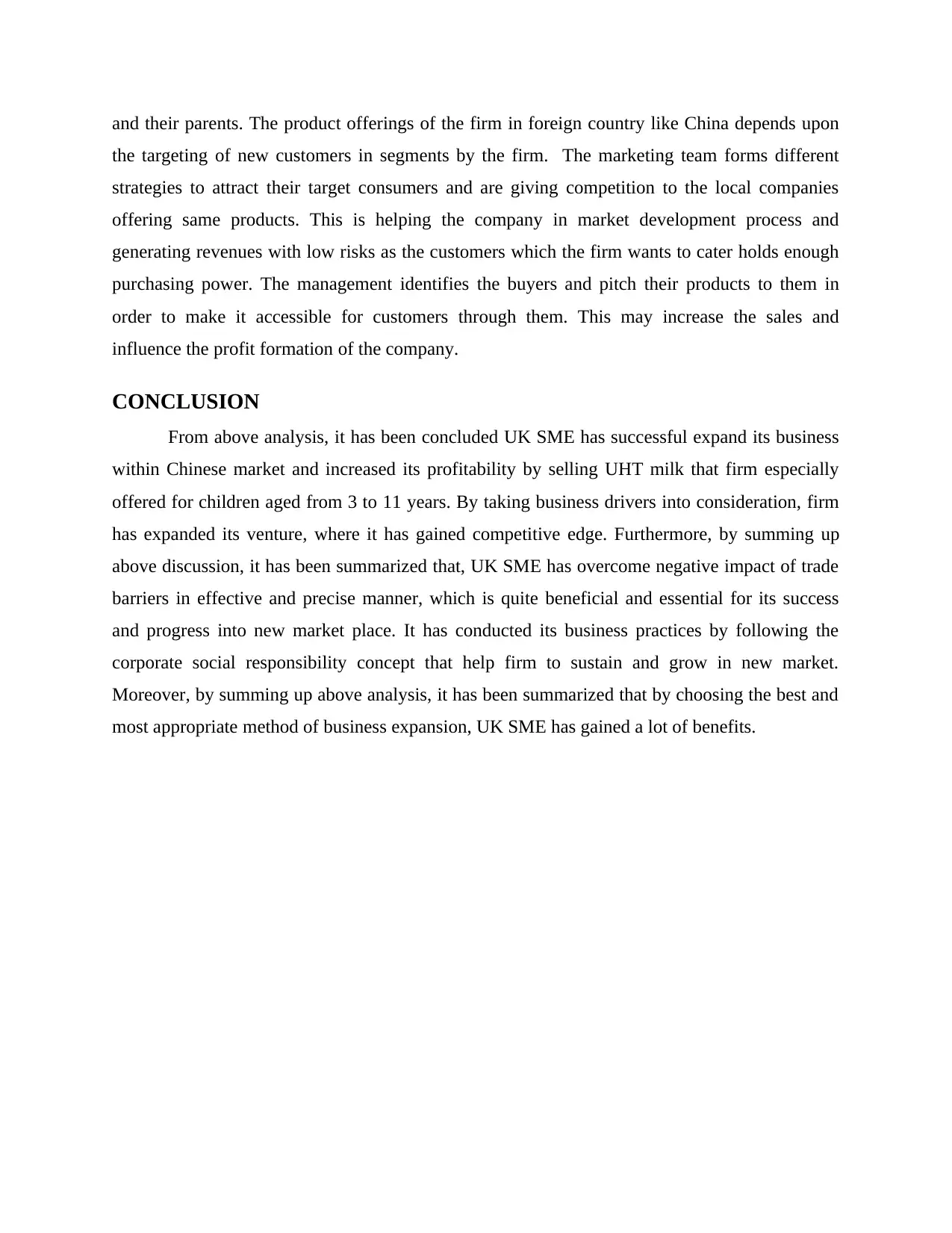
and their parents. The product offerings of the firm in foreign country like China depends upon
the targeting of new customers in segments by the firm. The marketing team forms different
strategies to attract their target consumers and are giving competition to the local companies
offering same products. This is helping the company in market development process and
generating revenues with low risks as the customers which the firm wants to cater holds enough
purchasing power. The management identifies the buyers and pitch their products to them in
order to make it accessible for customers through them. This may increase the sales and
influence the profit formation of the company.
CONCLUSION
From above analysis, it has been concluded UK SME has successful expand its business
within Chinese market and increased its profitability by selling UHT milk that firm especially
offered for children aged from 3 to 11 years. By taking business drivers into consideration, firm
has expanded its venture, where it has gained competitive edge. Furthermore, by summing up
above discussion, it has been summarized that, UK SME has overcome negative impact of trade
barriers in effective and precise manner, which is quite beneficial and essential for its success
and progress into new market place. It has conducted its business practices by following the
corporate social responsibility concept that help firm to sustain and grow in new market.
Moreover, by summing up above analysis, it has been summarized that by choosing the best and
most appropriate method of business expansion, UK SME has gained a lot of benefits.
the targeting of new customers in segments by the firm. The marketing team forms different
strategies to attract their target consumers and are giving competition to the local companies
offering same products. This is helping the company in market development process and
generating revenues with low risks as the customers which the firm wants to cater holds enough
purchasing power. The management identifies the buyers and pitch their products to them in
order to make it accessible for customers through them. This may increase the sales and
influence the profit formation of the company.
CONCLUSION
From above analysis, it has been concluded UK SME has successful expand its business
within Chinese market and increased its profitability by selling UHT milk that firm especially
offered for children aged from 3 to 11 years. By taking business drivers into consideration, firm
has expanded its venture, where it has gained competitive edge. Furthermore, by summing up
above discussion, it has been summarized that, UK SME has overcome negative impact of trade
barriers in effective and precise manner, which is quite beneficial and essential for its success
and progress into new market place. It has conducted its business practices by following the
corporate social responsibility concept that help firm to sustain and grow in new market.
Moreover, by summing up above analysis, it has been summarized that by choosing the best and
most appropriate method of business expansion, UK SME has gained a lot of benefits.
⊘ This is a preview!⊘
Do you want full access?
Subscribe today to unlock all pages.

Trusted by 1+ million students worldwide
1 out of 14
Related Documents
Your All-in-One AI-Powered Toolkit for Academic Success.
+13062052269
info@desklib.com
Available 24*7 on WhatsApp / Email
![[object Object]](/_next/static/media/star-bottom.7253800d.svg)
Unlock your academic potential
Copyright © 2020–2025 A2Z Services. All Rights Reserved. Developed and managed by ZUCOL.





